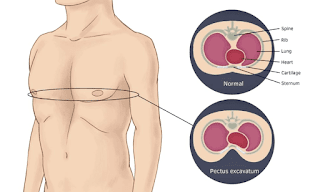Can Pectus Excavatum Be Correct or Not?

We are well known about the Pectum Excavatum , which is a chest deformity where the rib cage grows inward rather than outward. It is a harmful and cosmetic issue in the majority of cases. Pectus Excavatum Can be correct or not? Yes, the Pectus excavatum can be correct. No matter it is mild or severe. Different types of treatments are available for different types of pectus. The patient should be clear about the type of Pectus Excavatum, who is facing it. Now the question arises, what is the difference between mild or severe pectus. Mild Pectus : Mid pectus doesn’t affect how the lungs work and no need for treatments to cure it. Severe Pectus : Severe pectus interferes with the function of the heart and lungs. There are some surgeries to correct severe pectus. 1. Nuss procedure ...


